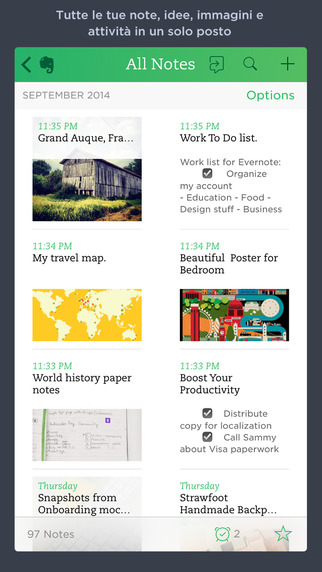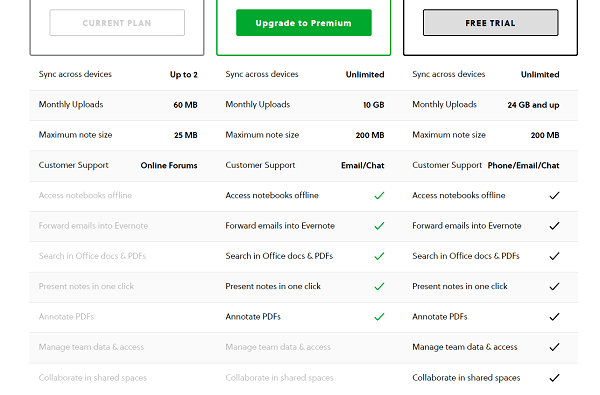Evernote to Wunderlist integration works to instantly send Evernote to-dos to Wunderlist as tasks. Just type to-dos with checkboxes, tag the note and TaskClo. Tapping the “Open in Evernote” link launches the Evernote app, enabling users to view their reminders in more detail. The process is similar with the Outlook-Wunderlist integration.
Among the daily activities we do at the office all day long we can count for sure notes taking, either to remember something that needs to be done later or to make a plan for a project we’re working on or to write down something that might be of importance some point in the future.
As you can imagine there are plenty of online apps that let you do just that. All you have to do is pick and choose a service that’s reliable and which helps take notes fast, on your phone, tablet or desktop, notes that you can later search, organize and share with your peers.
Cloud sync is mandatory, so you can access your notes on a computer for example, right after you’ve left a meeting where you only used your phone. But let’s skip to the meat of the article and see the apps I’ve used in the past or use right now:
Evernote
I think that Evernote is one of the pioneers of note-taking. The app does so much more than that, including saving web pages, adding audio and video memos, formatted text (of course), tables and to-do lists.
App capabilities differ from platform to platform, so depending on what device you’re on the things you can add to your notes differ quite significantly. On phones and tablets, you can add hand-written text, audio, and video recordings from the onboard cameras, while the web interface is slightly more limiting, but there are browser extensions that enhance these capabilities, including full-page or partial web page clippings. If you do install the desktop app things improve significantly.
No matter the method you’re using to take notes, you can start on one device and continue on another. Easy and intuitive.
The free account limits the maximum note size and you also have a monthly quota, which resets periodically.
There are also quite a few other differences between free and paid accounts, especially when it comes to team management, functionality only available to business accounts. Sharing notes and notebooks (collection of notes) can be done on either account types, even the free plan.
Even if you don’t opt to subscribe and stay on the free plan, for a single individual there’s enough functionality to enjoy Evernote and find your previous notes with ease.
Personally I’m not a big fan of Evernote, as I find Microsoft OneNote more convenient. The truth is on the other hand that Evernote is well supported by third party services, so there’s a chance the service is already integrated into your favorite mobile apps, so you can save notes from basically everywhere.
Microsoft OneNote
My favorite app at the time of writing this article is OneNote from Microsoft. It’s probably partially because the app comes preinstalled on Windows 10 and is also available on pretty much any operating system out there, including the defunct Windows Phone.
Fortunately, the web version is more than capable, allowing you to take handwritten notes, using the mouse cursor if you don’t have a touchscreen and can even leverage the webcam for video and audio notes. OneNote is one of the few apps that doesn’t sacrifice functionality in the browser version.

Like Evernote, it can organize notes in notebooks, but you can also add subnotebooks, for better management. Plus, if that’s not enough for you, there are add-ons that enhance functionality or integrate with third party services.
Notes and attachments are stored in your OneDrive account. This way you can access these files in the cloud, but you also need to make sure you have plenty of space to store them and, very important, don’t erase a notebook by mistake.
Collaboration options are also present, at the notebook level, so you can share and participate in notes for the whole team.

Evernote Vs Wunderlist
Another alternative to Evernote and OneNote, much simpler, is Google Keep. When it comes to functionality, the app is really basic. You can’t even save notes in notebooks, but you do have the option to apply multiple labels.
What Google Keep does really well is taking handwritten notes on the web interface. The drawing algorithm is pretty good, as you can see in the comparison below.
Sometimes you just need to bookmark interesting articles you see online so you can read them later. You can it by using browser extensions, or the included bookmark functionality or using, or with apps like Evernote and OneNote, but the easiest way I’ve found to organize web pages is with Pocket.
All browsers offer the possibility to create bookmarks and even sync them via the cloud if you sign up for a free account. Pocket does that and more, by supporting every major browser out there. Since I’m using more than one browser on my computer this is a godsend.
Pocket organizes saved pages in articles and videos sections. You can add tags, archive pages that disappear from the main list and assign favorite badges to the ones you like. You can even send links by email and they’ll be sent to your account automatically.
Articles can be read directly in the app interface, where the content and design will be stripped to the bare minimum: text and images. It makes for a very fast reading experience.
What makes Pocket’s offering strong is the high number of compatible services and apps like Twitter, Feedly, Flipboard and all major browsers. The paid plan offers support for offline article download, which will be available even if the source gets deleted.
Microsoft To-Do Wunderlist
When you work on multiple projects at once it’s easy to forget the things you have to do. In these moments the best help comes from a to-do list app that offers an easy interface to add tasks and mementos, organize them into lists and set reminders.
I’ve tested personally quite a few options before getting to Wunderlist, the app that completely changed the way I work.
Wunderlist And Evernote
In Wunderlist you can create folders for lists of to-dos. You can move mementos manually to another list, you can sort them by a few criteria, you can even share lists with collaborators and you can choose how you get notified.
Mementos can have attachments like text, links, and files, and can even be split into subtasks if needed. Using folders means you can separate personal and work quite easily. I’m using separate lists for groceries and for the projects I’m working on.
Wunderlist can be accessed both in the browser and on many popular operating systems. If there’s something I don’t like about Wunderlist is that it was acquired a while ago by Microsoft, and will be moved/migrated soon to Microsoft To-Do, their own organizer. Microsoft announced that Wunderlist will be shut down completely.
At the start, Microsoft’s offering was quite inferior to Wunderlist. The original owner recently even said at some point he would like to buy back the app from Microsoft. Fast forward a few months of using the new app and I can honestly say that Microsoft To-Do is just as good as Wunderlist. It’s not perfect, but shows what it means to have the man-power to tackle a problem. Acer power st driver. Hope Microsoft continues on this path with To-Do. It’s a pretty usefull app for me.
These are the apps I recommend after using them for quite some time now, but if you wish to try something different I suggest you check out Todoist and Remember The Milk.
